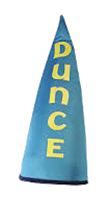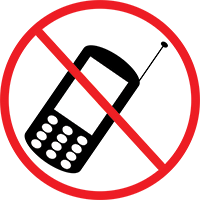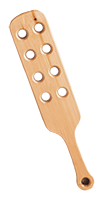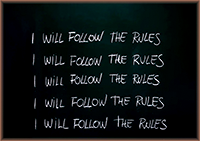| What |
Then |
Now |
Dunce Cap
 |
Thirteenth-century theologian John Duns Scotus first conceived of the pointed cap as “a reverse funnel for knowledge,” and the hat remained a symbol of intelligence until the 1500s, when Protestant humanists began to mock Duns’ intellectual heirs. |
As late as the 1950s teachers sent disruptive or slow-learning students into the corner of the classroom to wear a dunce cap and incur the derision of their peers. In 2021 a Maine lawyer challenged a local Covid-19 mask mandate by comparing the requirement to making him wear a dunce cap. The court dismissed his suit. |
Device Confiscation
 |
Pagers were banned from many classrooms around the United States in the late 1980s, both for their disruptive beeping and for their alleged connections to illicit drug commerce. “It is a dangerous thing to start banning objects that are merely associated with criminals,” one Brooklyn high schooler told a journalist in 1988. “What comes next—the banning of certain types of clothing or hairstyles?” |
In 2014 an Aquinas College professor’s policy of requiring students whose phones rang during class to answer on speakerphone backfired when a student’s friend called her pretending to be a pregnancy-resource-center counselor. The event was secretly filmed on a cell phone and today has more than 69 million views on YouTube. |
Paddling
 |
An instrument of punishment on antebellum American plantations, flat wooden paddles later became a common disciplinary tool in classrooms. In 1977 a Florida student sued his principal after a paddling “so severe that he suffered a hematoma.” The case reached the U.S. Supreme Court, which ruled that the Eighth Amendment applied only to prisoners. |
Paddling is still permitted in nineteen states; in Mississippi, 85 percent of school districts allow it. “Our number one goal is to educate students, and part of that is having an orderly, disciplined classroom,” a state administrator told a journalist in 2019. “If a family decides they want to opt out of corporal punishment as a discipline option, they can absolutely do that. |
Writing Lines
 |
“Writing lines is the penance,” one author wrote in 1887, that English schoolboys “do for all their sins, in and out of school.” Since the first episode of The Simpsons aired in 1989, Bart has written more than ten thousand lines on a Springfield Elementary School chalkboard. |
In 2016 a professor in Chengdu gained media attention for his updated version of the practice: rather than being told to write the same sentence hundreds of times, students who arrive late to his class are forced to write out a list of one thousand emoji. |
Rattan Cane
 |
The rattan cane was so feared by students in one Montreal classroom that in 1882 they began using a rubber shield “in localities where the vengeance of the pedagogue is prone to fall.” In response, the teacher invented an alternative punishment heralded as “genius” in the New York Times: a “mustard plaster well sprinkled with red pepper” that burned when applied to the skin. |
Rattan canes continue to be used in classrooms in countries where corporal punishment is permitted, such as Nigeria, where an Igbo adage holds that “the body listens better than the ear.” In the Igbo language the word for teacher, onye nkuzi, is a combination of the word onye (person), nku (stick), and zi (to direct). |




